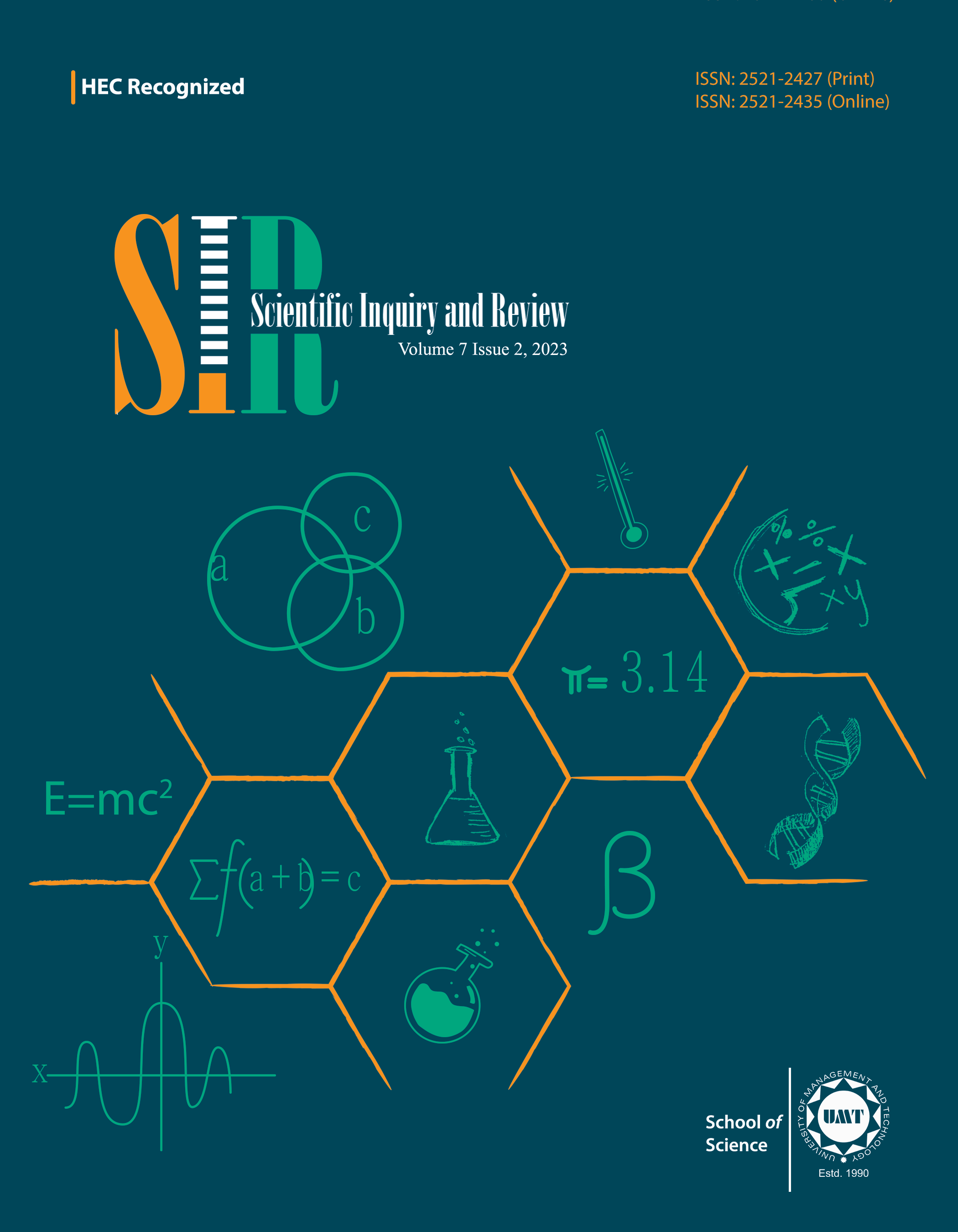Potential of Antioxidant Enzymes as biochemical biomarkers for glyphosate-based herbicide in Oreochromis niloticus
Abstract
 Abstract Views: 35
Abstract Views: 35
The current study examined the toxicity of Roundup, which is a herbicide containing glyphosate that is commonly used in agriculture, on Oreochromis niloticus, a type of freshwater fish. The researchers investigated the effectiveness of using antioxidant enzymes as biochemical biomarkers to assess the potentially toxic impact of Roundup on the fish. The sub-lethal concentration of Roundup in tilapia is 1.05 mg/l for 96 hours of exposure. The fish were exposed to sub-lethal concentration (36.8 to 46.9 mg/L) of Roundup for a period of 24, 48, 72, and 96 hours, and their antioxidant enzyme activities were measured, respectively. According to the findings, Roundup exposure led to a noticeable rise in the levels of superoxide dismutase, catalase, and peroxidase activities in both the liver and gill tissues of the fish, which suggested the occurrence of oxidative stress. These changes in antioxidant enzyme activities were concentration-dependent, suggesting that Roundup exposure can induce oxidative damage in fish. The study concluded that Roundup affects the enzymatic activity of both organs in a concentration- and time-dependent manner. Catalase and peroxidase activities were generally inhibited, while superoxide dismutase activity was affected differently depending on the organ, concentration, and time of exposure.
Downloads
References
Tariq MI, Afzal S, Hussain I. Pesticides in shallow groundwater of Bahawalnagar, Muzafargarh, D.G. Khan and Rajan Pur districts of Punjab, Pakistan. Environ Int. 2004;30(4):471–79. https://doi.org/10.1016/j.envint.2003.09.008
Rana SM, Asi MR, Niazi F, Sultana S, Ghazala, Al-Ghanim KA. Determination of organochlorine and nitrogen containing pesticide residues in Labeo rohita. Toxicol Environ Chem. 2011;93(10):1851–1855. https://doi.org/10.1080/02772248.2011.585746
Soares D, Silva L, Duarte S, Pena A, Pereira A. Glyphosate use, toxicity and occurrence in food. Foods. 2021;10(11):e2785. https://doi.org/10.3390/foods10112785
Benbrook CM. Trends in glyphosate herbicide use in the United States and globally. Environ Sci Eur. 2016;28(1):e3. https://doi.org/10.1186/s12302-016-0070-0
Belo MSdSP, Pignati W, Dores EFGdC, Moreira JC, Peres F. Pesticide use in soybean production in Mato Grosso state, Brazil: A preliminary occupational and environmental risk characterization. Rev Brasil de Saúde Ocup. 2012;37:78–88.
Uddin MH, Shahjahan M, Ruhul Amin AKM, Haque MM, Islam MA, Azim ME. Impacts of organophosphate pesticide, sumithion on water quality and benthic invertebrates in aquaculture ponds. Aquacul Rep. 2016;3:88–92. https://doi.org/10.1016/j.aqrep.2016.01.002
Karadag H, Fırat Ö, Fırat Ö. Use of oxidative stress biomarkers in Cyprinus carpio L. for the evaluation of water pollution in Ataturk Dam Lake (Adiyaman, Turkey). Bulletin Environ Cont Toxicol. 2014;92(3):289–293. https://doi.org/10.1007/s00128-013-1187-0
Nardi J, Moras PB, Koeppe C, Dallegrave E, Leal MB, Rossato-Grando LG. Prepubertal subchronic exposure to soy milk and glyphosate leads to endocrine disruption. Food Chem Toxicol. 2017;100:247–252. https://doi.org/10.1016/j.fct.2016.12.030
Naz S, Mansouri B, Chatha AMM, et al. Water quality and health risk assessment of trace elements in surface water at Punjnad Headworks, Punjab, Pakistan. Environ Sci Pollut Res Int. 2022;29(40):61457–61469. https://doi.org/10.1007/s11356-022-20210-4
Naz S, Hussain R, Ullah Q, Chatha AMM, Shaheen A, Khan RU. Toxic effect of some heavy metals on hematology and histopathology of major carp (Catla catla). Environ Sci Pollut Res. 2021;28(6):6533–6539. https://doi.org/10.1007/s11356-020-10980-0
Parrino V, De Marco G, Minutoli R, et al. Effects of pesticides on Chelon labrosus (Risso, 1827) evaluated by enzymatic activities along the north eastern Sicilian coastlines (Italy). Euro Zoolog J. 2021;88(1):540–48. https://doi.org/10.1080/24750263.2021.1905090
Díaz-Resendiz K, Ortiz-Lazareno P, Covantes-Rosales C, et al. Effect of diazinon, an organophosphate pesticide, on signal transduction and death induction in mononuclear cells of Nile tilapia fish (Oreochromis niloticus). Fish Shellfish Immunol. 2019;89:12–17. https://doi.org/10.1016/j.fsi.2019.03.036
Oropesa A, García Cambero J, Soler F. Effect of long‐term exposure to simazine on brain and muscle acetylcholinesterase activity of common carp (Cyprinus carpio). Environ Toxicol: An Int J. 2008;23(3):285–293. https://doi.org/10.1002/tox.20342
Al-Saeed FA, Naz S, Saeed MH, et al. Oxidative stress, antioxidant enzymes, genotoxicity and histopathological profile in oreochromis niloticus exposed to lufenuron. Pak Veter J. 2023;43(1):160–166. http://dx.doi.org/10.29261/pakvetj/2023.012
Glusczak L, dos Santos Miron D, Crestani M, et al. Effect of glyphosate herbicide on acetylcholinesterase activity and metabolic and hematological parameters in piava (Leporinus obtusidens). Ecotoxicol Environ Saf. 2006;65(2):237–241. https://doi.org/10.1016/j.ecoenv.2005.07.017
Selionova MI, Podkorytov NA. Polymorphism of the gene GDF9 in sheep of Prikatun type of Altai Mountains breedand its correlation with indices of meat rate productivity. Theory Prac Meat Proc. 2021;6(1):4–9. https://doi.org/10.21323/2414–438X‑2021–6–1–4–9
Ferreira L, Soares MAM, Rodrigues MT, et al. UCP2 and PPARG gene polymorphisms and their association with milk yield and composition traits in goats. Small Rum Res. 2020;192:e106210. https://doi.org/10.1016/j.smallrumres.2020.106210
Javadi A, Shamaei M, Mohammadi Ziazi L, et al. Qualification study of two genomic DNA extraction methods in different clinical samples. Tanaffos. 2014;13(4):41–47
Au - Desjardins P, Au - Conklin D. NanoDrop microvolume quantitation of nucleic acids. JoVE. 2010(45):e2565. https://doi.org/doi:10.3791/2565
Das SK, Fanburg BL. Hyperoxia elevates cu,zn-superoxide dismutase of endothelial cells as detected by a sensitive ELISA. Enzyme. 1992;46:188–195. https://doi.org/10.1159/000468787
Li Y, Ding W, Li X. Acute exposure of glyphosate-based herbicide induced damages on common carp organs via heat shock proteins-related immune response and oxidative stress. Toxin Rev. 2021;40(4):1071–1083. https://doi.org/10.1080/15569543.2019.1621903
Ghaffar A, Hussain R, Ahmad N, et al. Evaluation of hemato-biochemical, antioxidant enzymes as biochemical biomarkers and genotoxic potential of glyphosate in freshwater fish (Labeo rohita). Chem. 2021;37(7):646–667. https://doi.org/10.1080/02757540.2021.1937141
Bortner CD, Oldenburg NB, Cidlowski JA. The role of DNA fragmentation in apoptosis. Tren Cell Biol. 1995;5(1):21–26. https://doi.org/10.1016/s0962-8924(00)88932-1
Lee RF, Steinert S. Use of the single cell gel electrophoresis/comet assay for detecting DNA damage in aquatic (marine and freshwater) animals. Mut Res. 2003;544(1):43–64. https://doi.org/10.1016/s1383-5742(03)00017-6
Williams JR, Little JB, Shipley WU. Association of mammalian cell death with a specific endonucleolytic degradation of DNA. Nature. 1974;252(5485):754–755. https://doi.org/10.1038/252754a0
Copyright (c) 2023 Saima Naz, Ahmad Manan Mustafa Chatha, Syeda Saira Iqbal, Azka Kiran, Maria Lateef, Anab zahra

This work is licensed under a Creative Commons Attribution 4.0 International License.







